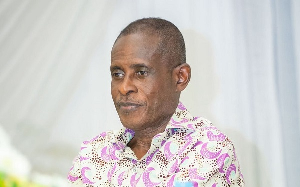By Nii Ayitey Tetteh
‘Rumour’ has been toying with Ghanaian hearts in the last few weeks. Wasn’t it ‘Rumour’ who claimed that Barcelona and then later Swansea were after our very own Mubarak Wakaso? Wasn’t it this same ‘Rumour’ who told us that Liverpool were on Christian Atsu’s heels? That Fulham were jostling for Mohammed Rabiu’s signature? Like we say in our Ghanaian parlance: “We have been sitting here and waiting,” still, no show! Zilch! No major Ghanaian transfer! ‘Major’ here is used to mean either a prestigious or a progressive move; one involving a transfer from Ghana to Europe or a Europe based Ghanaian player moving to either an elite club or an elite league.
So far, it has been movement to the new transfer haven; South Africa which respectfully, is just a transit to the major European leagues. ‘Rumour’ also has it that Hearts of oak’s Mahatma Otoo, who won both goal-king and MVP of the just ended 2012/2013 season, is in Belgium to sign with Club Brugge. However, no firm deal has been announced.
Indeed, such has been the pattern; loads of rumors with no firm deals. Granted the entire transfer market has been somewhat slow in the first half and is expected to be buoyant towards the end of August; but you can’t help notice the absence of any major move by a Ghanaian player. Apart from Kwadwo Asamoah who made a major move from Udinese to Juventus last year, it’s been relatively quiet, the last couple of years. To think that not too long ago there had been some major Ghanaian transfers. In 2003, Stephen Appiah moved from Brescia to Juventus for €8 million Euros; In 2006 Michael Essien moved from Lyon to Chelsea for a hefty €36 million Euros; in 2007, Sulley Muntari left Udinese to Portsmouth for €11.8 million Euros; that same year, a certain Ahmed Apimah Barusso caused a stir by moving from a lower tier club, Rimini to Roma for €3.4 million Euros. Before all that however, there was Alex Nyarko who moved to Everton for €6.3 million Euros in 2000; a year before that, then rising star Eric Addo moved from Club Brugge to PSV for €5 million Euros.
I deliberately recalled some of these old transfers to put the situation in perspective; Ghanaian players once made decent moves, especially after tournaments, sadly, we can’t say same today. So, what accounts for the slow Ghanaian transfer activity? Well, for starters, transfers have moved beyond the talent of the player, a lot more premium is placed on other factors.
The Value Factor
Over the course of time, football transfers have evolved. Hitherto a Ghanaian player’s talent was enough to secure a foreign contract. Not so anymore. Today, clubs and by extension the agents that broker these multi-million deals, look for players who bring added value to their prospective employers. Value factors like premium position, marketability, and adaptability are some of the factors that could make or break prospective deals. Premium position refers to positions which clubs consider crucial to their successes. So, don’t be surprised that generally strikers are in more demand than midfielders, who are also in more demand than defenders, who are also in more demand than goalkeepers. Now, when you consider that Ghana hardly produces good strikers; that effectively narrows the players that will be signed from Ghana. Even though Ghana also produces good defenders, European coaches have become so scientific that they will usually sign defenders, especially centre backs with an appreciable height. Now, for a country that sometimes judges players especially at the youth level on how short or young you look, we would naturally not produce tall or imposing defenders. The one area where Ghana competes favourably is the midfield. Even in that area, Europeans have turned their eyes towards the archetypal ‘Essien like’ players. Somehow, with the successes of the Bouba Diops, Essiens and Yaya Toures in defensive midfield, European clubs look out for African players built in such mold. The saddest part is that, even when they don’t find such players, they look for players with such attributes and convert them to defensive midfielders. That is why today, Kwadwo Asamoah is a wing back and Derek Boateng, a defensive midfielder. The European clubs look to South America or mainland Europe for the more creative midfielders. This once again narrows African and for that matter Ghanaian players’ opportunities for major transfer moves. European clubs also look for players who are marketable and are thus inclined towards players with particular nationalities or from particular regions; that is why the Brazilians and even Asian players now seem to be getting more contracts because they are connected to huge markets where merchandising can be maximized. But then again there is another factor that topples the value factor.
The Agent Factor
It is true that talent, premium position, adaptability and marketability all count in securing contracts but all that do not count as much as the ability of a player’s agent to negotiate impossible deals. Have you not wondered why Derek Boateng, a player getting to the twilight of his career and who hardly played for Dnipro in the second half of the season is able to secure a contract to Fulham? It’s all the work of his agent. Super agents like Jorge Mendes have negotiated some impossible deals and none is more illustrative of an agent’s power than when Manchester United signed Bebe. When Alex Fergusson, then in charge, was asked about Bebe, he confessed that he hadn’t seen Bebe play before, but he trusted his agent. Agents make things happen and the more Ghanaian players align themselves with such super agents the more major transfers we will see. Until then, I am sure you are no more in doubt about the factors that go to influence sale and purchase of Ghanaian players; they are one of the few certainties of the transfer market; sure, you can go on and consume that, its rumour free.
niiayitey29@gmail.com
follow me on twitter @niithesoccerguy
(Culled from 90 Minutes Newspaper)
Sports Features of Monday, 5 August 2013
Source: Nii Ayitey Tetteh
Where are the major Ghanaian transfers?
Opinions












